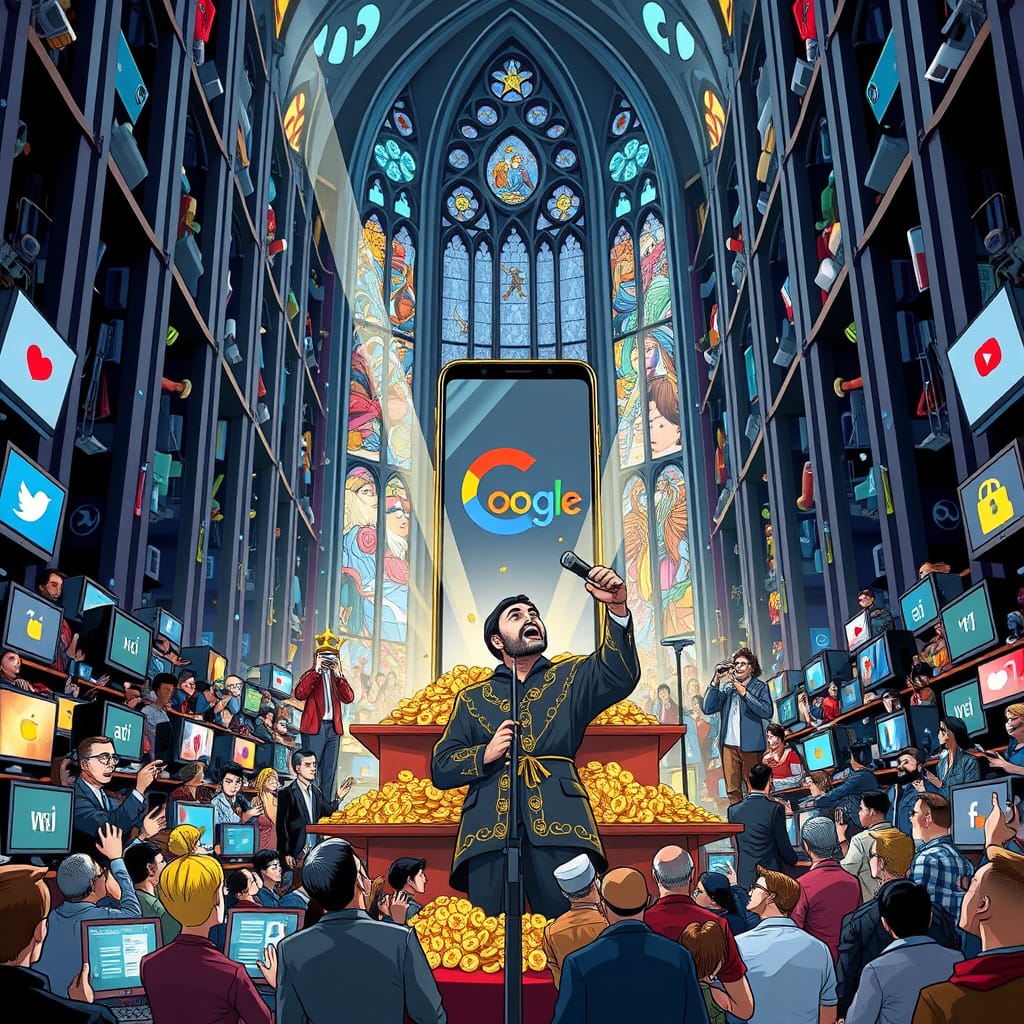In which we examine how advertising transformed the web from humanity’s greatest library into humanity’s most sophisticated slot machine
The internet was supposed to be different. Back in the 1995, when dial-up modems sang their mechanical hymns and “You’ve Got Mail” was still a source of genuine excitement rather than existential dread, the web promised to be humanity’s great equalizer. Information would be free, knowledge would flow like fine digital wine, and we would all become enlightened beings connected across the vast expanse of the internet.
Instead, we got Google.
The Original Sin: A Brief Theology of Web Economics
To understand how we arrived at our current digital purgatory, we must first examine the fateful decision that doomed the internet from its very inception: the choice to fund this brave new world through ads (advertising). Like the biblical Adam and Eve reaching for that forbidden fruit, early web pioneers bit into the apple of ad revenue, and we have been living with the consequences ever since.
The logic seemed sound at the time. After all, TV had thrived on advertising for decades. Radio had built entire empires on the promise of selling soap and cigarettes between musical interludes. Why shouldn’t the internet follow the same model? What could possibly go wrong with creating a medium where success was measured not by the quality of information or the enrichment of human knowledge, but by the ability to capture and monetize human attention?
EVERYTHING, as it turns out.
The moment we decided that websites should be “free” in exchange for our eyeballs, we inadvertently created the most sophisticated behavioral modification machine in human history. We built a system where the primary incentive wasn’t to inform, educate, or even entertain, but to addict. To keep users clicking, scrolling, and consuming in an endless dopamine-driven feedback loop that would make B.F. Skinner weep with professional admiration.
Enter the Prophet: How Google Became the High Priest of Digital Commerce
Into this advertising-funded wilderness stepped Google, armed with an algorithm and a mission statement that would have made Orwell chuckle: “Don’t be evil.” The company that would eventually become synonymous with internet search began as a humble Stanford research project, two PhD students trying to organize the world’s information. Noble enough, until they realized that organizing information was significantly less profitable than organizing human behavior.
Google’s genius wasn’t in creating a better search engine—though they certainly did that. Their true innovation was in perfecting the art of monetizing human curiosity. They transformed the simple act of asking a question into a complex auction system where businesses bid for the privilege of answering you, whether their answer was relevant or not.
The AdWords system, launched in 2000, after the world survived the Y2K bug, was advertising’s equivalent of splitting the atom. Suddenly, every search query became a micro-transaction, every click a tiny payment into Google’s ever-expanding coffers. The company had discovered how to turn human knowledge-seeking behavior into a perpetual money-printing machine, and they’ve been refining this process with the dedication of medieval monks illuminating manuscripts.
The Doctrine of Engagement: Why Your Attention Became Currency
Under Google’s benevolent guidance, the world wide web evolved from an information superhighway into what can only be described as a digital casino designed by behavioral psychologists with unlimited budgets and questionable ethics. Every website became a slot machine, every notification a pull of the lever, every “recommended for you” section a carefully calculated attempt to keep you playing just a little bit longer.
The company’s PageRank algorithm, once a simple method for determining which websites were most authoritative on the internet, gradually morphed into something far more sophisticated: a system for predicting and influencing human behavior. Google didn’t just want to know which websites were popular; they wanted to know which websites would keep you engaged long enough to click on an advertisement.
This shift from information retrieval to attention capture fundamentally changed the nature of the web itself. Websites that once prioritized accuracy, depth, and genuine utility found themselves competing against content farms optimized for one thing: keeping eyeballs glued to screens long enough for ads to load. The internet’s original promise of democratizing information was quietly replaced by a new mission: democratizing distraction.
The Surveillance Capitalism Cathedral
Google’s advertising empire didn’t just change how we consume information; it revolutionized how information consumes us. The company built the most comprehensive surveillance apparatus in human history, not through government mandate or authoritarian decree, but through the simple expedient of offering “free” services in exchange for data.
Every search query, every email, every location ping, every YouTube video watched became a data point in an ever-expanding profile of human behavior. Google didn’t just know what you were looking for; they knew what you were going to look for before you did. They could predict your interests, your political leanings, your shopping habits, your relationship status, and your likelihood of clicking on an ad for artisanal beard oil at 2:47 PM on a Friday.
This data collection wasn’t a byproduct of Google’s services—it was the entire point. The search engine, the email platform, the video hosting site, the mobile operating system: all of these were simply different collection mechanisms for the same underlying product. And that product wasn’t information or entertainment or communication. It was you.
The Great Acceleration: How Ads Ate the Internet
As Google’s advertising machine grew more sophisticated, it began to exert a gravitational pull on the entire web ecosystem. Websites that wanted to be found had to optimize themselves not for human readers, but for Google’s spiders (because, das SEO!). Content creators learned to write not for clarity or truth, but for “engagement metrics.” The very structure of online discourse began to warp around the demands of adsense optimization.
The rise of programmatic advertising—automated systems that buy and sell ad space in real-time auctions—turned every webpage into a miniature stock exchange. Your arrival at any website triggered a complex bidding war among advertisers, with algorithms making split-second decisions about which ads were most likely to extract money from your particular demographic profile.
This system created perverse incentives throughout the digital ecosystem. News websites discovered that outrage generated more clicks than nuance. Social media platforms learned that controversy kept users engaged longer than consensus. Educational content found itself competing against clickbait designed by teams of data scientists whose only goal was maximizing “time on site.”
The Network Effect of Digital Decay
Google’s advertising dominance didn’t just corrupt individual websites; it corrupted the very fabric of online discourse. The company’s algorithms began to favor content that generated immediate engagement over content that provided long-term value. Websites optimized for Google’s search rankings started to resemble each other, creating an increasingly homogenized web where originality was punished and conformity to algorithmic preferences was rewarded.
The result was a kind of digital natural selection, where only the most addictive, most engaging, most algorithmically optimized content survived. Thoughtful analysis was crowded out by hot takes. In-depth reporting was replaced by listicles. The web’s vast library of human knowledge was gradually transformed into an endless feed of content designed to capture attention rather than convey understanding.
The Prophecy Fulfilled: How Advertising Will Kill the Web
We now stand at the precipice of advertising’s final victory over the internet’s original promise. The web that was once humanity’s greatest tool for sharing knowledge has become humanity’s most effective tool for manufacturing consent, manipulating behavior, and extracting value from human attention.
The signs of the coming digital apocalypse are everywhere. Users increasingly rely on ad blockers, creating an arms race between content creators and audience that benefits no one except the companies selling ad-blocking technology. Privacy regulations like GDPR have forced companies to ask for explicit consent to track users, leading to the now-ubiquitous cookie banners that have turned every website visit into a legal negotiation.
Meanwhile, the rise of AI-generated content threatens to flood the web with algorithmically optimized articles designed not to inform humans, but to fool other algorithms into thinking they’re reading something written by humans. We’re approaching a future where the internet consists primarily of robots writing content for other robots to index, while humans are reduced to the role of unwitting participants in an automated attention economy.
The Google Paradox: Success Through Systematic Failure
The most remarkable aspect of Google’s advertising empire is how it has managed to profit from the very problems it created. The company’s search algorithm helped create a web so cluttered with low-quality, ad-optimized content that users increasingly rely on Google to filter through the noise. The more polluted the web becomes with advertising-driven content, the more valuable Google’s filtering services become.
This creates a perfect feedback loop: Google’s advertising business incentivizes the creation of low-quality content, which makes Google’s search services more valuable, which generates more advertising revenue, which incentivizes more low-quality content. It’s a perpetual motion machine powered by human attention and lubricated with behavioral data.
The company has become so skilled at this game that they’ve managed to convince the world that their advertising-driven business model is not just inevitable, but beneficial. They’ve positioned themselves as the guardians of “free” information while simultaneously being the primary architects of the system that makes genuinely free information increasingly difficult to find.
The Final Algorithm: When the Web Eats Itself
As we look toward the future, the trajectory seems clear. The advertising-driven web is approaching a kind of digital heat death, where all content converges toward the same algorithmic optimizations, all websites look increasingly similar, and all human expression is filtered through the lens of advertising effectiveness.
Google’s latest AI initiatives promise to accelerate this process. Their large language models, trained on the advertising-optimized web, are now being used to generate even more advertising-optimized content. We’re creating a recursive loop where AI systems trained on human-written content are now writing content for humans to read, with both the training data and the output optimized for the same advertising-driven metrics.
The web that began as humanity’s greatest collaborative project is becoming humanity’s greatest collaborative delusion: a shared hallucination where we pretend that “free” services are actually free, that algorithmic recommendations represent genuine choice, and that a medium designed to sell us things can simultaneously serve as our primary source of truth about the world.
Perhaps this was always inevitable. Perhaps any system that relies on capturing and monetizing human attention will eventually optimize itself into irrelevance. Perhaps Google’s greatest achievement isn’t organizing the world’s information, but proving that organizing the world’s information is far less profitable than disorganizing human attention.
The original sin of the web wasn’t choosing advertising as a funding model. It was believing that we could build a system designed to manipulate human behavior while somehow preserving human agency. We created a medium that treats human attention as a commodity to be harvested, and then expressed surprise when human attention became increasingly scarce and fragmented.
Google didn’t corrupt the internet’s original promise. They simply revealed what that promise was always going to become once we decided that the price of “free” information was our capacity to think clearly about anything at all.
What’s your take on the advertising-driven web? Have you noticed how your own browsing habits have changed as algorithms have become more sophisticated? Do you think there’s a way back to the internet’s original promise, or are we doomed to scroll through an endless feed of content optimized for engagement rather than enlightenment? Share your thoughts below—assuming you can resist the urge to check your notifications first.
Enjoyed this dose of uncomfortable truth? This article is just one layer of the onion.
My new book, “The Subtle Art of Not Giving a Prompt,” is the definitive survival manual for the AI age. It’s a guide to thriving in a world of intelligent machines by first admitting everything you fear is wrong (and probably your fault).
If you want to stop panicking about AI and start using it as a tool for your own liberation, this is the book you need.
>> Get your copy now (eBook & Paperback available) <<





GIPHY App Key not set. Please check settings